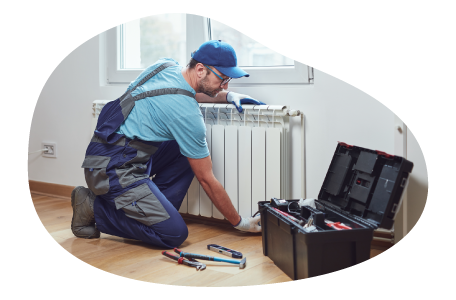
Find insurance for handyman contractors in North Carolina
Learn about license requirements and the most common handyman insurance policies in North Carolina.

Get the right coverage
Insureon helps handyman contractors compare insurance quotes from top-rated U.S. providers.
Get free expert advice and peace of mind knowing you have the right insurance options for your unique risks.
What are the most common policies for handymen in North Carolina?
Handyman contractors may need different types of insurance coverage depending on the work they do. These are the most popular insurance policies for North Carolina contractors to protect against financial losses.
General liability insurance
A general liability policy covers basic risks, such as accidental damage to a client's sink. Bundle with commercial property insurance for savings in a business owner’s policy (BOP).
- Customer bodily injuries
- Customer property damage
- Advertising injuries
Business owner's policy
A BOP bundles general liability coverage and commercial property insurance at a discount. It's often the most cost-effective type of insurance for handyman businesses.
- Accidents that injure clients
- Client property damage
- Damage to your building or its contents
Workers’ compensation insurance
Most states require workers’ comp for handyman businesses that have employees. It also protects sole proprietors from job-related medical costs that health insurance might deny.
- Employee medical expenses
- Disability benefits
- Lawsuits from work-related injuries
Commercial auto insurance
A commercial auto policy covers third-party bodily injuries and property damage in accidents involving work vehicles. It can also cover vehicle theft and vandalism.
- Auto accident lawsuits
- Physical damage and collision coverage
- State requirements for auto liability coverage
Tools and equipment insurance
This type of insurance helps pay for repair or replacement of a handyperson's hammers, saws, drills, wrenches, and other tools if they are lost, stolen, or damaged.
- Tools less than five years old
- Equipment valued at less than $10,000
- Items brought to jobsites
Professional liability insurance
Professional liability insurance covers legal fees when a handyman is sued for a mistake or oversight. It's also called errors and omissions insurance (E&O).
- Accusations of negligence
- Failure to finish a project on time
- Undelivered services
Surety bonds
A surety bond is an agreement between a handyman contractor, a client, and an insurance company. It guarantees the insurer will reimburse the client if the contractor fails to fulfill their contract.
- Project delays
- Loss of key staff
- Failure to obtain materials
Builder's risk insurance
Builder's risk insurance covers a structure in progress and materials at a construction site. It's sometimes called course of construction insurance.
- Fires
- Storms
- Theft of materials
Contractors pollution liability insurance
Pollution liability insurance can help pay for legal costs related to particulates or other pollution that came from your worksite. It's sometimes called environmental insurance.
- Accidental spills
- Cleanup costs
- Pollution lawsuits
Which policies are required for a handyman in North Carolina?
Whether you're in Raleigh, Charlotte, Greensboro, or elsewhere in North Carolina, you may need the following types of handyman business insurance to comply with local laws:
General liability insurance
Handyman contractors in North Carolina typically aren't required to carry general liability insurance. However, it may depend on your location and the scope of work for certain jobs.
General liability insurance protects your business from legal expenses stemming from common mishaps, such as customer bodily injuries and property damage.
Most commercial leases require businesses to carry this coverage. Adding commercial umbrella insurance can boost your coverage on general liability insurance and other types of liability insurance.
Contractor general liability insurance can also help protect against advertising injuries, such as libel, slander, and copyright infringement. For example, it'll pay for your legal defense costs if a competitor sues your business for making a false statement about them on social media.
Workers' compensation insurance
To meet state requirements and get licensed in North Carolina, handyman businesses with three or more employees must provide workers’ compensation insurance, which covers medical bills and disability benefits for work injuries. Your business may also need this coverage if you're trying to pull a permit for a job. Handyman contractors often need this coverage if they want to subcontract with another company.
Independent contractors and sole proprietors in risk-laden professions, such as roofers, tree service technicians, and HVAC contractors, should consider carrying workers' comp in North Carolina even if they don't have any employees. This is because personal health insurance is unlikely to cover work-related injury claims.
Most workers' comp policies also include employer's liability insurance, which helps pay for workplace injury lawsuits.
Commercial auto insurance
Commercial auto insurance covers property damage and medical bills resulting from an accident involving your handyman business's vehicle. Depending on the coverage options you choose, it can also pay for vehicle theft, weather damage, and vandalism.
Minimum auto liability requirements for North Carolina businesses are:
- $30,000 in bodily injury liability per person
- $60,000 in bodily injury liability per accident
- $25,000 in property damage liability
For vehicles used by the business but are leased, rented, or otherwise not owned by the company, you'll need a separate policy called hired and non-owned auto insurance (HNOA). This policy provides liability insurance but doesn't cover damage to the insured vehicle.
Personal auto insurance will typically not cover any driving for business purposes, which is why you may need supplemental coverage.
Surety bonds
Licensure requirements in North Carolina sometimes include a surety bond, depending on the type of work you do.
A surety bond guarantees reimbursement for the client if a handyman fails to fulfill the terms of a contract or adhere to regulations. Common types of surety bonds include bid bonds, performance bonds, and payment bonds.

Do I need a license to be a handyman in North Carolina?
While there isn’t a specific handyman license in North Carolina, you may need a contractor’s license depending on the value of the job. If your project costs more than $40,000, you’ll need a general contractor license.
North Carolina offers three designations of contractor licenses:
- Limited license: Allows contractors to undertake individual projects up to $750,000 each
- Intermediate license: Contractors can accept individual jobs up to $1,500,000 each
- Unlimited license: There's no dollar limit on the size of the projects that can be undertaken
Specialty trades, such as electrical, plumbing, or HVAC work, may also require a separate designation.
Like in other states, getting licensed often involves passing an exam, proving work experience, completing a background check, and paying fees. You’ll likely also need insurance coverage, such as general liability and workers’ comp, depending on the type of work you do and whether you have employees.
How much does handyman insurance cost in North Carolina?

North Carolina handyman contractors who buy policies from Insureon pay an average of:
General liability: $63 per month
Workers' compensation: $90 per month
Commercial auto: $283 per month
Several factors affect handyman insurance premiums, including:
- Home repair and handyman services you provide, such as concrete or carpentry
- Business property and equipment
- Business income and size
- Years of experience
- Policy limits and deductibles
- Claims history
Verified business insurance reviews
Hear from customers like you who purchased small business insurance.
How do I get North Carolina handyman insurance?
Insureon helps you save time and money shopping for handyman liability insurance by comparing quotes from top U.S. insurance companies.
Our insurance agents are licensed in North Carolina and can answer your questions as you consider coverage.
To make the application go quicker, have this information ready:
- Workforce details, such as the number of employees and subcontractors
- Current and projected revenue
- Business partnerships
- Desired coverage limits
- Claims history
- Commercial lease insurance requirements
Apply for free insurance quotes today to find cheap handyman insurance that fits your business needs. Most small business owners receive a certificate of insurance (COI) for proof of insurance the same day.
